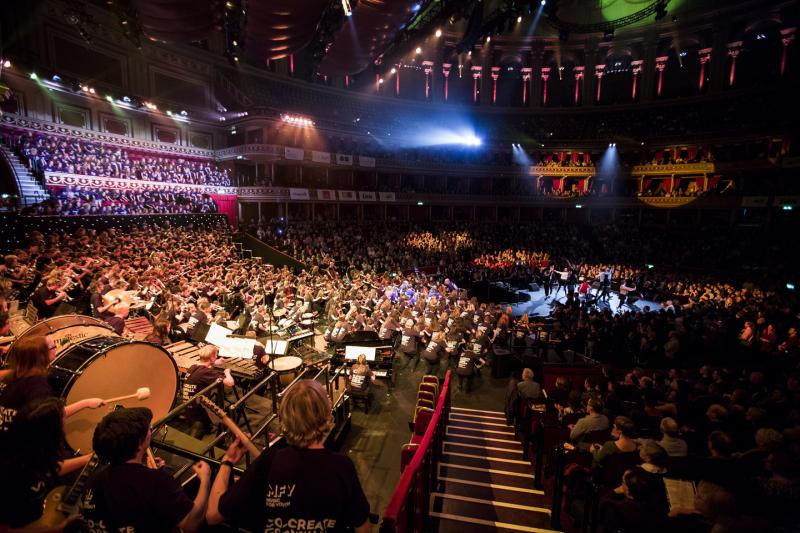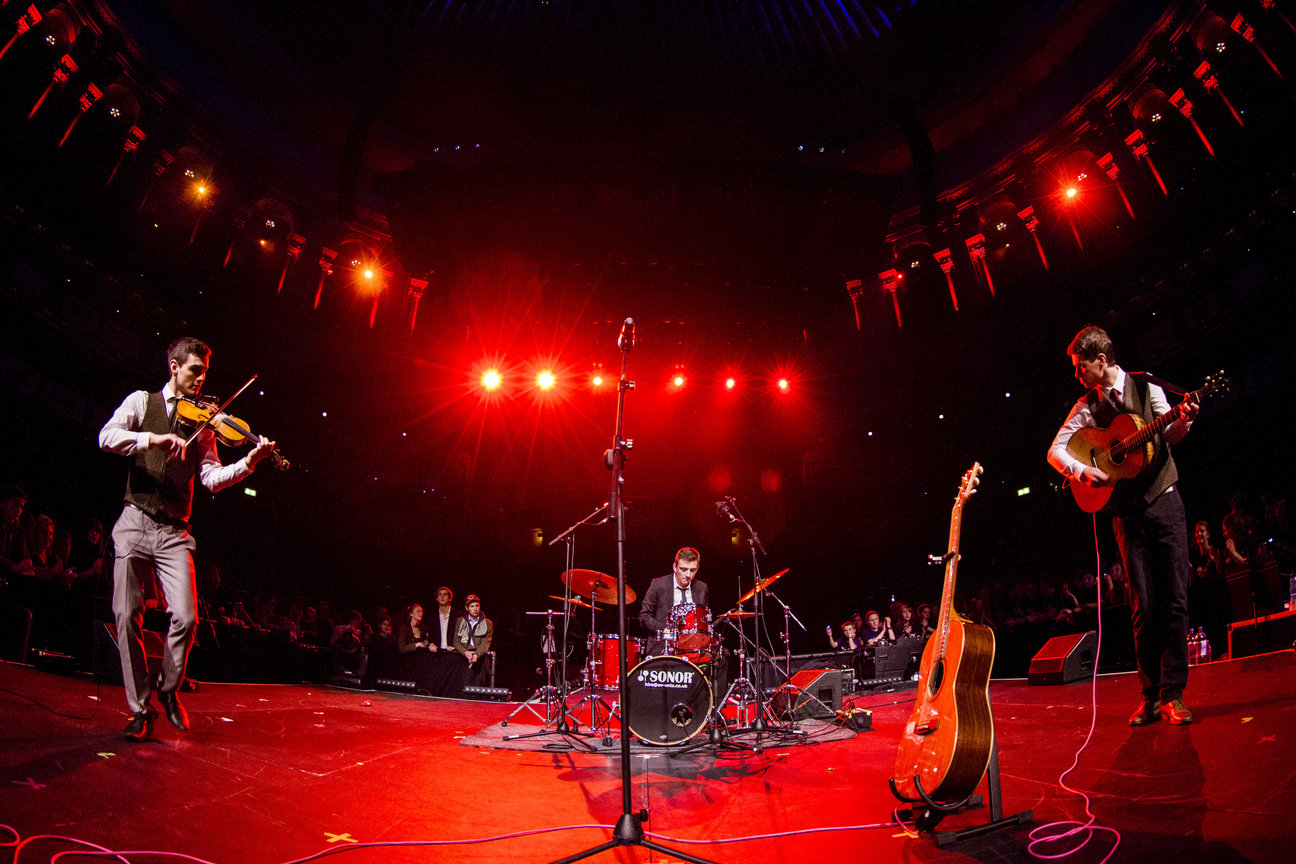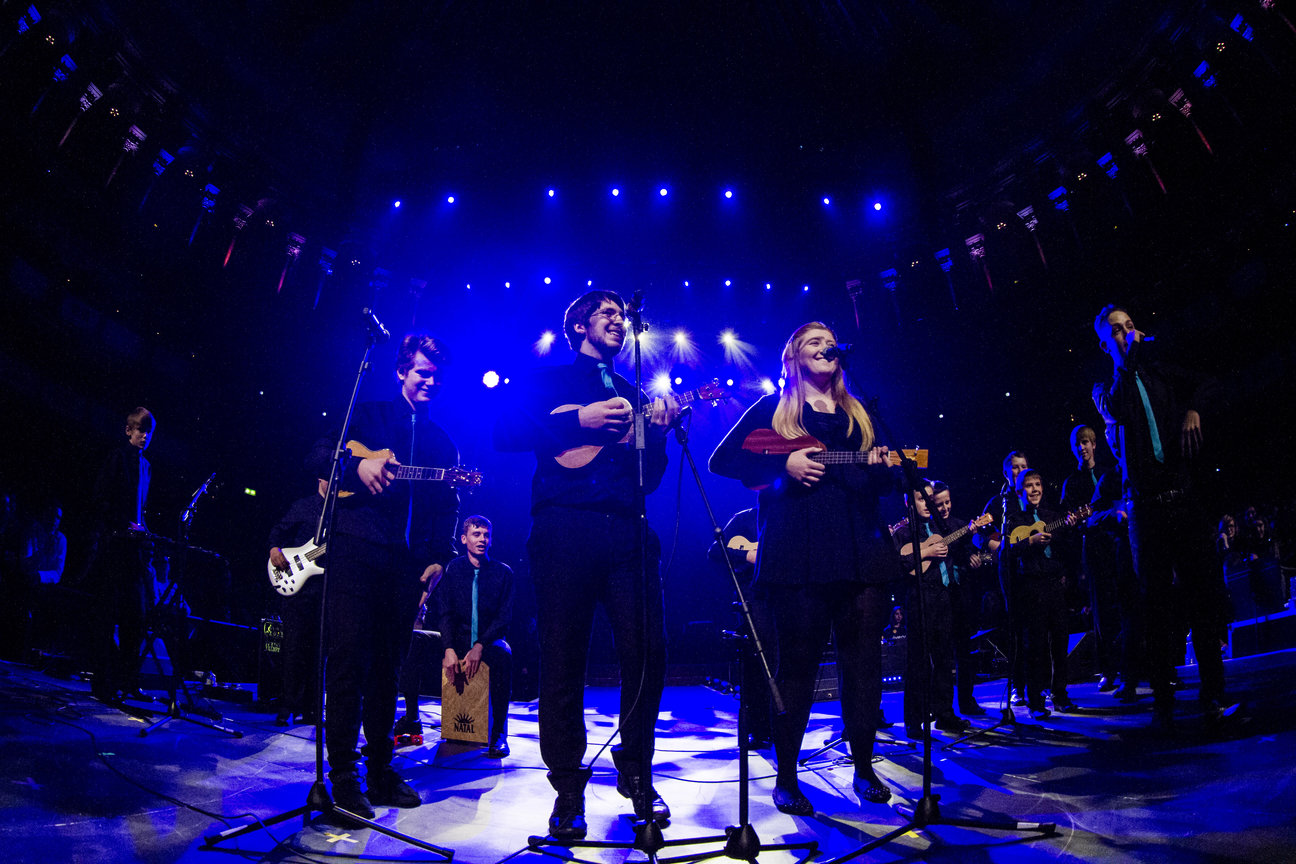Schools' Prom, Royal Albert Hall | reviews, news & interviews
Schools' Prom, Royal Albert Hall
Schools' Prom, Royal Albert Hall
Hundreds of young musicians come together to make a musical miracle

This year I’ve sat through Carrie Cracknell’s Wozzeck dry-eyed, seen a handful of Mimis take their last consumptive breath without so much as a tremor, even heard Shostakovich’s shattering Symphony No. 13 without obvious emotional distress. I was beginning to think I was getting irretrievably jaded, hardened; then a bunch of Welsh kids with ukuleles and a folk trio from the Highlands came along and everything changed.
Music education in the UK has never been more embattled, more fragile. The music centres across the country that gave my generation that first addictive taste of ensemble music-making no matter how rural their communities, the curriculum that ensured that my parents’ generation grew up with music in schools as a matter of course – both are part of a nostalgic past that no longer exists. And yet teachers persist, working ever harder and more creatively to fill the gaps. People can’t afford to heat their homes, can’t reliably feed their families; why should we fund music education? I can’t think of a better answer to that than the annual Schools’ Prom.
With tight riffs, characterful playing and radiating joy they completely stole my heart
Split across three nights each year at the Royal Albert Hall, the event is just the culmination of ongoing work by national charity Music For Youth, who have reached an astonishing 2.5 million people over the years. Workshops, mentoring, group projects and regional performances all lead back to this flagship event that showcases just some of the students involved and their extraordinary talents.
It’s a real mix of ensembles (with a different line-up for each of the three nights) ranging from youth orchestras to rappers, classical repertoire to contemporary pop – whatever gets the performers excited. And what’s most striking once you get over the sheer joy, the overflowing energy of the whole experience, is just how comfortable and confident these young people seem in the cavernous Royal Albert Hall, a venue that has swallowed up many a professional ensemble.
 Strumming, bowing (in the case of Hosta, pictured right) and blowing with the same insouciance they’d bring to a school assembly or a local gig, these performers are having an absolute ball doing what they do. Spotlights travel and strobe, colours blur and blend, but your eyes (and ears) are still drawn to the figures at the centre – amplified perhaps by the effects, but in an X-Factor world so undeniably, so authentically the real thing.
Strumming, bowing (in the case of Hosta, pictured right) and blowing with the same insouciance they’d bring to a school assembly or a local gig, these performers are having an absolute ball doing what they do. Spotlights travel and strobe, colours blur and blend, but your eyes (and ears) are still drawn to the figures at the centre – amplified perhaps by the effects, but in an X-Factor world so undeniably, so authentically the real thing.
It takes a lot to get up and perform at the Royal Albert Hall, even with a nicely printed score and a full geography of the work in front of you. What an achievement then for teacher Lauren Brant to lead the pupils of the Dulwich Hamlet Junior School Fusion Ensemble (aged 10-11) in the score-less, semi-improvised Scandinavian Sounds, bringing together tuned percussion and conventional instruments for a Peer Gynt-inspired sonic tapestry with only her cues to guide them. The result was a genuinely unexpected atmospheric delight, dominated by some extraordinary young brass players.
Older brass performers were also the stars of the City of Hull Youth Jazz Orchestra (13-19), featuring an extraordinary solo trombonist and a collective trombone passage of absurd rhythmic complexity. With their tight riffs, characterful playing and radiating joy they completely stole my heart – that is, until folk-trio Hosta from the Highlands (18-20) came along. Combining folk fiddling, guitar and moody vocals, the group are as assured as they are original. I don’t know where in Scotland they got their stage presence, but the Highlands really can’t hope to keep these musicians to themselves for much longer – what electric energy, what clever fusion of style. And then there were The Debuts from Swindon – another trio, this time in a deliciously retro guitar-pop vein – who knew more than any 16-year-olds have any right to about working a crowd.
 The biggest surprise of the evening though was Caerphilly’s Lewis & The Ukes (13-18, pictured left). “Ukelele orchestra” has always sounded more like a threat than a description to me, but reworked as a neat little band with a trio of fabulous singers and a rapper barely bigger than his microphone and you something at once quaintly old-fashioned and absolutely fresh.
The biggest surprise of the evening though was Caerphilly’s Lewis & The Ukes (13-18, pictured left). “Ukelele orchestra” has always sounded more like a threat than a description to me, but reworked as a neat little band with a trio of fabulous singers and a rapper barely bigger than his microphone and you something at once quaintly old-fashioned and absolutely fresh.
Each night’s performance features a “Massed Ensemble” – a regional group bringing together some 600 performers from different ensembles into a single musical experience. Hailing from Cornwall, last night’s army had everything to play for in Joe Broughton’s One and All. Somehow accommodating a recorder consort, endless string players, a youth choir and enough brass to fill the UK’s entire quota of military bands in his writing, he managed to produce a work of huge appeal and directness.
I may need the rest of the year to recover emotionally, but I’ll be first in line for the 2014 Schools’ Prom. There’s something in the combination of youth, hope, ambition and joy that no professional performance I’ve witnessed recently has come close to touching. It makes me proud, but it also makes me very scared for the future. Will we still find such diversity of performers, such drive in a decades time when music is long since dead in schools? We can only hope, and support charities like Music For Youth and the extraordinary teachers on show last night, who are doing their damnedest to make sure that we do.
- Find out more about Music For Youth
rating
Explore topics
Share this article
The future of Arts Journalism
You can stop theartsdesk.com closing!
We urgently need financing to survive. Our fundraising drive has thus far raised £49,000 but we need to reach £100,000 or we will be forced to close. Please contribute here: https://gofund.me/c3f6033d
And if you can forward this information to anyone who might assist, we’d be grateful.

Subscribe to theartsdesk.com
Thank you for continuing to read our work on theartsdesk.com. For unlimited access to every article in its entirety, including our archive of more than 15,000 pieces, we're asking for £5 per month or £40 per year. We feel it's a very good deal, and hope you do too.
To take a subscription now simply click here.
And if you're looking for that extra gift for a friend or family member, why not treat them to a theartsdesk.com gift subscription?
more Classical music
 BBC Proms: Ehnes, Sinfonia of London, Wilson review - aspects of love
Sensuous Ravel, and bittersweet Bernstein, on an amorous evening
BBC Proms: Ehnes, Sinfonia of London, Wilson review - aspects of love
Sensuous Ravel, and bittersweet Bernstein, on an amorous evening
 Presteigne Festival 2025 review - new music is centre stage in the Welsh Marches
Music by 30 living composers, with Eleanor Alberga topping the bill
Presteigne Festival 2025 review - new music is centre stage in the Welsh Marches
Music by 30 living composers, with Eleanor Alberga topping the bill
 Lammermuir Festival 2025 review - music with soul from the heart of East Lothian
Baroque splendour, and chamber-ensemble drama, amid history-haunted lands
Lammermuir Festival 2025 review - music with soul from the heart of East Lothian
Baroque splendour, and chamber-ensemble drama, amid history-haunted lands
 BBC Proms: Steinbacher, RPO, Petrenko / Sternath, BBCSO, Oramo review - double-bill mixed bag
Young pianist shines in Grieg but Bliss’s portentous cantata disappoints
BBC Proms: Steinbacher, RPO, Petrenko / Sternath, BBCSO, Oramo review - double-bill mixed bag
Young pianist shines in Grieg but Bliss’s portentous cantata disappoints
 theartsdesk at the Lahti Sibelius Festival - early epics by the Finnish master in context
Finnish heroes meet their Austro-German counterparts in breathtaking interpretations
theartsdesk at the Lahti Sibelius Festival - early epics by the Finnish master in context
Finnish heroes meet their Austro-German counterparts in breathtaking interpretations
 Classical CDs: Sleigh rides, pancakes and cigars
Two big boxes, plus new music for brass and a pair of clarinet concertos
Classical CDs: Sleigh rides, pancakes and cigars
Two big boxes, plus new music for brass and a pair of clarinet concertos
 Waley-Cohen, Manchester Camerata, Pether, Whitworth Art Gallery, Manchester review - premiere of no ordinary violin concerto
Images of maternal care inspired by Hepworth and played in a gallery setting
Waley-Cohen, Manchester Camerata, Pether, Whitworth Art Gallery, Manchester review - premiere of no ordinary violin concerto
Images of maternal care inspired by Hepworth and played in a gallery setting
 BBC Proms: Barruk, Norwegian Chamber Orchestra, Kuusisto review - vague incantations, precise laments
First-half mix of Sámi songs and string things falters, but Shostakovich scours the soul
BBC Proms: Barruk, Norwegian Chamber Orchestra, Kuusisto review - vague incantations, precise laments
First-half mix of Sámi songs and string things falters, but Shostakovich scours the soul
 BBC Proms: Alexander’s Feast, Irish Baroque Orchestra, Whelan review - rapturous Handel fills the space
Pure joy, with a touch of introspection, from a great ensemble and three superb soloists
BBC Proms: Alexander’s Feast, Irish Baroque Orchestra, Whelan review - rapturous Handel fills the space
Pure joy, with a touch of introspection, from a great ensemble and three superb soloists
 BBC Proms: Moore, LSO, Bancroft review - the freshness of morning wind and brass
English concert band music...and an outlier
BBC Proms: Moore, LSO, Bancroft review - the freshness of morning wind and brass
English concert band music...and an outlier
 Willis-Sørensen, Ukrainian Freedom Orchestra, Wilson, Cadogan Hall review - romantic resilience
Passion, and polish, from Kyiv's musical warriors
Willis-Sørensen, Ukrainian Freedom Orchestra, Wilson, Cadogan Hall review - romantic resilience
Passion, and polish, from Kyiv's musical warriors
 BBC Proms: Faust, Gewandhausorchester Leipzig, Nelsons review - grace, then grandeur
A great fiddler lightens a dense orchestral palette
BBC Proms: Faust, Gewandhausorchester Leipzig, Nelsons review - grace, then grandeur
A great fiddler lightens a dense orchestral palette

Add comment